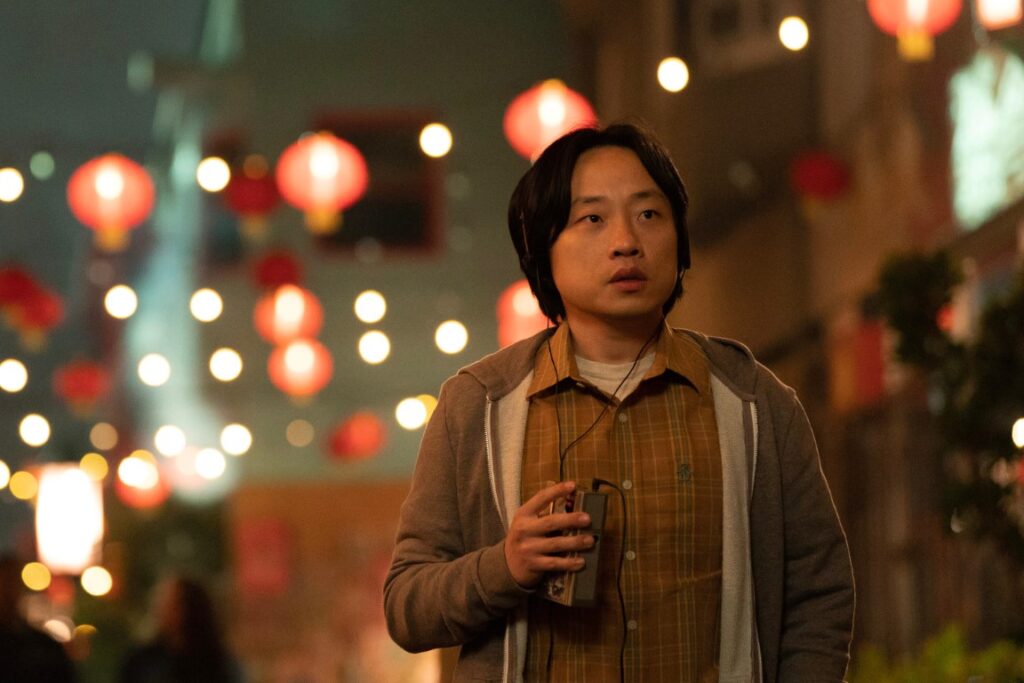The 2020s have been prime for Asian-made films and shows that explore the Asian-American experience in unique and captivating ways. Sean Wang’s Myspace-era dramedy feature “Dìdi” and Disney’s modern adaptation of “American Born Chinese” underlined the relatable identity struggles many underrepresented groups feel in America to get their share of the spotlight. Showrunner/creator Charles Yu’s adaptation of his award-winning novel, “Interior Chinatown,” examines that motif through the eyes of an adult man facing an existential crisis in a “Truman Show”-like scenario. However, unlike Truman, our hero, Willis Wu (Jimmy O. Yang), is far from the protagonist.
During the 1990s, when everyone relies on pagers and Walkmen, Willis, a waiter at a Chinese food restaurant in Chinatown, aspires to find meaning in his stifled existence. He lives a routine lifestyle, from working at his restaurant to getting drunk with his pals. But his longing for action grows further on the 12th anniversary of his kung-fu prodigy older brother’s (Chris Pang) disappearance. Willis laments to his best friend/co-worker Faty (an always hilarious Ronny Chieng) how he feels trapped like a background character in somebody else’s story. Unbeknownst to him, he is. Willis is merely a background character in a police procedural drama series called “Black & White: Impossible Crimes Unit.” Much like how ‘’Free Guy’ centered around a video game NPC, “Interior Chinatown” is the television show equivalent.
Soon after, Willis finds his chance for the spotlight when he becomes a key witness to a crime in Chinatown. Enter Detective Lana Lee (Chloe Bennet), “Black & White”‘s newest recurring character/detective: she’s referred to as ‘The Chinatown Expert’ by her peers, co-leads Sarah Green (Lisa Gilroy) and Miles Turner (Sullivan Jones), despite never having been in Chinatown herself. Lee informs Willis that there is a criminal underbelly hidden in the midst of Chinatown, and his brother, who used to work at the police force as their ‘Kung Fu Guy,’ is involved. Because she doesn’t know Chinatown as much as he does, for he has never left it, she enlists him for his expertise. He’s so relegated to the background that the hands of fate keep him from getting close to the action when it’s most needed.
With the first five episodes provided for review, “Interior Chinatown” proves itself a sharp, stylish commentary on the lack of Asian representation in ’90s media. Where the source novel was formulated like a feature film script, Yu and his writing team bring those elements to vivid life on screen.
Some of the book’s action lines and character descriptions comprised much of its humor, and the series uses unique visual cues to express them. When the “Black & White” leads are in Willis’ vicinity, the lighting instantly shifts from a natural hue to a blue tint, the picture format shifts from full screen to widescreen, and the dialogue plays up the familiar network police procedural drama corniness. More notably, the principal leads regard Willis as invisible, even when he’s in frame and trying to get their attention.
“Interior Chinatown”‘s embedded environment feels concrete because it maintains the illusion that these characters are not aware that they are in a show or playing a role. Even when the procedural show backdrop interferes, those who aren’t part of the scene simply describe it as odd. The metaphysical realm beyond them is solely contextualized by a 1990s television set that appears once a while between episodes. Yet, Willis’ film noir-like voiceover narration shows slight traces of Charlie Kaufman-esque existentialism. You want him to figure out the truth, but you also root for him to figure out his role in this world.
At long last, Yang finally gets the spotlight turn he deserves after years of supporting roles, and he shines bright. He delivers a charming and triumphant portrayal of self-actualization, rooted in the grievance of Asian underrepresentation and textured with passion.
Bennet is also terrific as Lana, a character on the opposite end of the same coin as Willis. In the show-within-a-show, Lana serves as the token Asian person, hired because of her ‘Chinatown expertise,’ and is often stereotyped onscreen. She exhibits strong-willed and intuitive qualities when she is in the natural world alongside Willis; on screen, she’s shown as amateurish. Bennet does an impressive job of switching between those modes in mere seconds, and they both have delightful chemistry.
“Interior Chinatown” is a visceral and biting satire of the minuscule and stereotypical roles Asian Americans had to play in American television while being an engaging neo-noir comedy. The bold liberties it takes fit the television medium pack a punch and only demonstrate Charles Yu’s versatility as a creator. One of 2024’s finest new shows.
Five episodes were provided for review. Streaming on Hulu.

